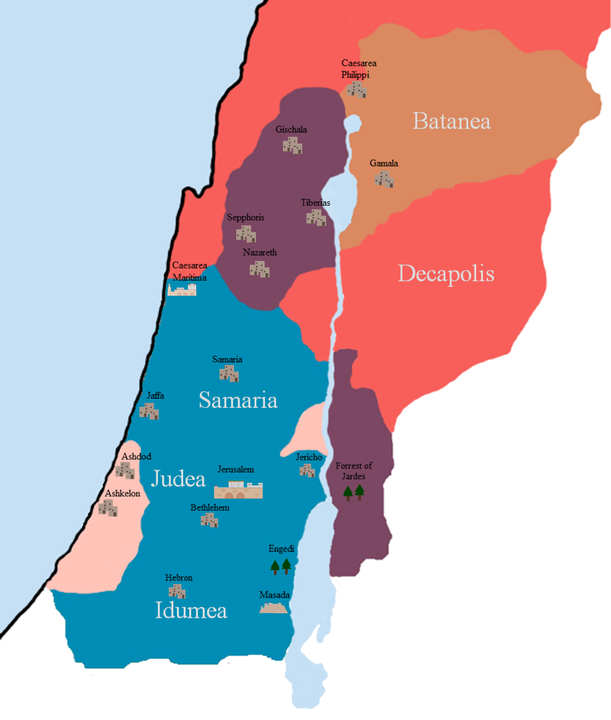Herod is dead, long live the King

A little touch of historicity.
After the death of Herod the Great (HtG) in around March 4 BC his kingdom was divided into four between his three sons and sister, Antipas, Archelaus, Philip, and Salome I. HtG due to paranoia had changed his will so many times, and having executed some of his sons, meant that the final version of his will had not been approved by Caesars Augustus, and therefore it couldn't be enacted.
This led to a dispute between two of the sons, Antipas and Archelaus concerning who should be the next king. The pair travelled to Rome to petition Caesar concerning their claims as "rightful King". Antipas had the support of the people due to the cruel character and brutality of Archelaus. They even petitioned Caesar not to make him their ruler. It’s interesting to note that the journey to Rome by the brothers may have been alluded to by Jesus or used as a source of inspiration in the parable of the minas (pounds) that is recorded in Luke 19:12-27. (KJV)
12 He said therefore, A certain nobleman went into a far country to receive for himself a kingdom, and to return.
13 And he called his ten servants, and delivered them ten pounds, and said unto them, Occupy till I come.
14 But his citizens hated him, and sent a message after him, saying, We will not have this man to reign over us.
15 And it came to pass, that when he was returned, having received the kingdom, then he commanded these servants to be called unto him, to whom he had given the money, that he might know how much every man had gained by trading.
16 Then came the first, saying, Lord, thy pound hath gained ten pounds.
17 And he said unto him, Well, thou good servant: because thou hast been faithful in a very little, have thou authority over ten cities.
18 And the second came, saying, Lord, thy pound hath gained five pounds.
19 And he said likewise to him, Be thou also over five cities.
20 And another came, saying, Lord, behold, here is thy pound, which I have kept laid up in a napkin:
21 For I feared thee, because thou art an austere man: thou takest up that thou layedst not down, and reapest that thou didst not sow.
22 And he saith unto him, Out of thine own mouth will I judge thee, thou wicked servant. Thou knewest that I was an austere man, taking up that I laid not down, and reaping that I did not sow:
23 Wherefore then gavest not thou my money into the bank, that at my coming I might have required mine own with usury?
24 And he said unto them that stood by, Take from him the pound, and give it to him that hath ten pounds.
25 (And they said unto him, Lord, he hath ten pounds.)
26 For I say unto you, That unto every one which hath shall be given; and from him that hath not, even that he hath shall be taken away from him.
27 But those mine enemies, which would not that I should reign over them, bring hither, and slay them before me.
When read in light of the historical background, the similarities become strikingly apparent, and they also shed light on the reason Jesus was brought up in the town of Nazareth in Galilee.
Back to historicity: Augustus followed the final version of HtG's will and split the kingdom between his three sons and sister Salome I. This reveals the level of HtG's paranoia because it's as if in his dying breath he cries out "if I can't be King forever then it too dies with me!". Caesar granted HtG's final wish, which meant none of his heirs was given the title of King.

Archelaus received the title of ethnarch (ruler of the people) over Judea, Idumea, and Samaria, his portion of HtG’s kingdom was the largest.
Antipas received the title of tetrarch (ruler over a fourth) over Galilee and Peraea.
Philip was also given the title of tetrarch and ruled over Gaulanitis, Traconitis, Batanaea, and Panias. [1]
Salome I, was given the title of toparch (ruler of a place). She was given cities and the surrounding area of Gaza and just north of Jericho, including Jabneh, Ashdod, and Phasaelis.
*These regions are shown in the above map.
This Herodian Tetrarchy only lasted until AD6 when Rome took direct control over the region of Judea and made it a province of the empire. Archelaus, because of his cruelty and the numerous complaints received by Caesar about him, got banished to Gaul in AD 6, thus ending Herodian rule in Judea. The first prefect "Coponius" was subsequently appointed and the rule of the prefects continued until AD41. (including that of Pontius Pilate).
One final thought from Luke 23:3 about who was King
3 So Pilate asked Jesus, “Are you the king of the Jews?”
“You have said so,” Jesus replied.
(but we all knew that anyhow. 😊)
Long live Jesus our King of Kings, and as always God bless,
Trev.
[1] "Excavating the evidence for Jesus" Titus Kennedy, Harvest House Publishers, P 61.